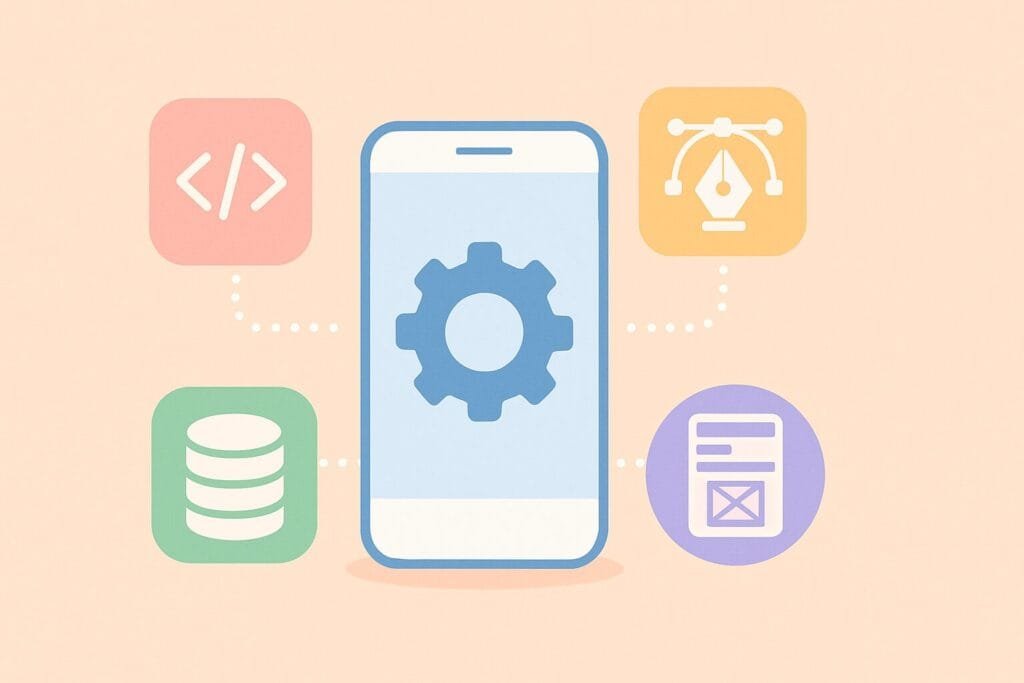As mobile applications continue to dominate the digital landscape, the demand for skilled mobile developers continues to grow rapidly. In 2025, mastering certain mobile development skills can set you apart from the competition and open up vast opportunities in both freelancing and full-time roles. Whether you’re building apps for Android, iOS, or cross-platform environments, learning the right tools and technologies will future-proof your career.

In this article, we’ll explore the top mobile development skills to learn in 2025, covering languages, frameworks, user experience, and emerging trends that every developer should be aware of.
1. Mastering Cross-Platform Frameworks (Flutter & React Native)
Cross-platform development has become a standard approach for many startups and even established companies. Flutter, developed by Google, and React Native, created by Facebook, allow developers to write code once and deploy it to both iOS and Android platforms.
In 2025, Flutter continues to rise with its fast development cycle, beautiful UI widgets, and strong community. React Native remains a favorite for companies already embedded in the JavaScript ecosystem.
Bonus Tip: For a hands-on guide to Flutter development, check out flutter.dev.
2. Kotlin and Swift – Modern Native Languages
Although cross-platform tools are popular, native development still holds critical importance, especially for performance-heavy apps.
- Kotlin is the preferred language for Android development and offers null-safety, concise syntax, and full support from Google.
- Swift is Apple’s powerful language for iOS and macOS apps, evolving continuously to offer speed, safety, and clarity.
Learning Kotlin or Swift deeply can help you land jobs at big tech companies and build high-performance apps.
3. Understanding Jetpack Compose and SwiftUI
UI frameworks are shifting towards declarative programming. Jetpack Compose (Android) and SwiftUI (iOS) are transforming how developers build interfaces.
Jetpack Compose eliminates XML, enabling UI creation directly in Kotlin, while SwiftUI does the same for Swift. These skills will become mandatory as both platforms continue to move away from legacy methods.
4. Backend Integration with Firebase and Supabase
A good mobile developer must understand backend basics. Firebase continues to be a top choice for real-time databases, authentication, and analytics. On the other hand, Supabase is gaining popularity as an open-source alternative to Firebase.
Learning these tools allows mobile developers to build full-stack applications efficiently without managing servers.
5. AI and Machine Learning Integration
AI is no longer optional in modern apps. From chatbots and image recognition to recommendation systems and voice assistants, AI-enhanced mobile apps are in high demand.
Familiarizing yourself with ML Kit, TensorFlow Lite, or Core ML can add a significant advantage to your mobile development portfolio.
6. App Performance Optimization and Security
As mobile apps handle more sensitive data and become more complex, security and performance optimization become essential.
Learning techniques such as lazy loading, secure data storage, encryption, and efficient state management (like Bloc or Riverpod in Flutter) will help ensure your apps run smoothly and safely.
7. UI/UX Design Thinking for Developers
Today’s developers are expected to know more than just code. A good grasp of UI/UX principles — such as intuitive navigation, accessibility, color theory, and responsive design — enhances collaboration with designers and improves app quality.
Tools like Figma or Adobe XD are now part of many developers’ toolkits, especially when prototyping ideas or collaborating in agile teams.
8. Version Control with Git and CI/CD Practices
Every professional developer must know Git for source code management. Additionally, continuous integration/continuous deployment (CI/CD) tools like GitHub Actions, Bitrise, or GitLab CI/CD are vital for automating builds, tests, and deployments.
CI/CD practices enhance team productivity and reduce bugs in production, making them critical for modern app development workflows.
Conclusion:
To succeed in 2025 and beyond, mobile developers must embrace a combination of modern programming languages, cross-platform frameworks, cloud services, and user-first thinking. Constant learning is key in a landscape that changes rapidly. Start with one or two of these skills and gradually expand and remember, mastering the fundamentals of mobile development is just as important as chasing trends.

